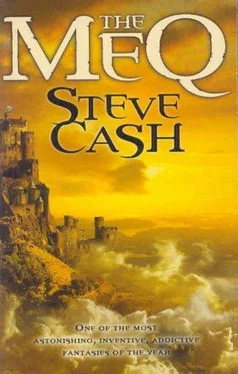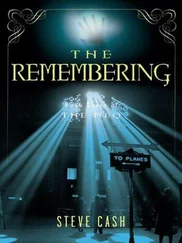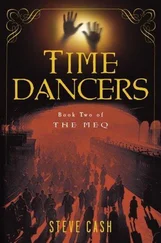Steve Cash - The Meq
Здесь есть возможность читать онлайн «Steve Cash - The Meq» весь текст электронной книги совершенно бесплатно (целиком полную версию без сокращений). В некоторых случаях можно слушать аудио, скачать через торрент в формате fb2 и присутствует краткое содержание. Год выпуска: 2005, Издательство: Del Rey, Жанр: Фэнтези, Детективная фантастика, ya, на английском языке. Описание произведения, (предисловие) а так же отзывы посетителей доступны на портале библиотеки ЛибКат.
- Название:The Meq
- Автор:
- Издательство:Del Rey
- Жанр:
- Год:2005
- ISBN:нет данных
- Рейтинг книги:4 / 5. Голосов: 1
-
Избранное:Добавить в избранное
- Отзывы:
-
Ваша оценка:
- 80
- 1
- 2
- 3
- 4
- 5
The Meq: краткое содержание, описание и аннотация
Предлагаем к чтению аннотацию, описание, краткое содержание или предисловие (зависит от того, что написал сам автор книги «The Meq»). Если вы не нашли необходимую информацию о книге — напишите в комментариях, мы постараемся отыскать её.
The Meq — читать онлайн бесплатно полную книгу (весь текст) целиком
Ниже представлен текст книги, разбитый по страницам. Система сохранения места последней прочитанной страницы, позволяет с удобством читать онлайн бесплатно книгу «The Meq», без необходимости каждый раз заново искать на чём Вы остановились. Поставьте закладку, и сможете в любой момент перейти на страницу, на которой закончили чтение.
Интервал:
Закладка:
“At first, the Basque in the coastal villages treated them the same as they had the Celts and Picts, who had come by sea from the north, as equal and respected traders. The Phoenicians came seldom and generally left the Basque alone. Then, their visits became more frequent and they left men in the villages with the Basque to mine tin and other metals they could trade in the East. The Basque became less and less enchanted with their presence. This was new to the Basque, who had been isolated in their land for thousands of years. The Phoenicians had sophisticated weaponry and fortified ships, however, and they were practical and more interested in good business than conquering lands. A few leaders of the five tribes of the Basque approached the Phoenicians with an offer. If the Phoenicians would remove their men from the mines and their standing armies from the villages and only trade, in the future, from their ships in the coves and harbors, the Basque would trade exclusively with the Phoenicians. But they were naive. The Phoenicians never planned on staying in the first place. The cost of mining and the distance of their routes were becoming less profitable. Nevertheless, they told the Basque they would agree to these terms if the Basque could offer them something as a ‘gift,’ something that would be treasured and desired by the rest of the world and only the Phoenicians would have it. And whatever it might be, it would be the bond that would seal the promise between the Basque and themselves. The Basque believed them. After many meetings among the leaders of the tribes, an Aita of the Autrigons suggested a ‘loan’ rather than a ‘gift.’ He said there was no gold, tin, silver, or anything else as rare as the ‘Children of the Mountains.’ He suggested that a few of us could travel with the Phoenicians, serving as ambassadors and symbols of the magic in the Basque homeland and also represent the power of the Phoenicians. No one else could think of a better alternative and they sent the Aita to talk with the uncle of Opari. What was said is not known, but for some reason he agreed and he spoke for all the ‘children.’
“The families gathered in a central village and were told of the situation and opportunity. We were also naive and many thought it would be an honor and a chance to travel beyond the Pyrenees, Opari and her sister Deza included.” Eder stopped and asked, “Do you know of Deza?”
“Yes,” I said, “a little, mainly just the name.”
She nodded and went on. “Opari and Deza had been in the Itxaron, the Wait, for hundreds of years. Neither had met their Ameq. They both hoped to be chosen for the voyage, but Opari wore the Stones and early at the gathering it was decided that the five who wore the Stones would be the ones to go. The disappointment Deza felt did not last long, however. At the gathering, Deza met her Ameq — my brother, Umla-Meq.
“He and I had been in the Itxaron for only a few years, like yourself, and he never expected it. I was not at the gathering, but he told me later about the shock of the experience. A thousand years later, I found out myself.”
“What exactly is the Itxaron?” I interrupted. “No one has ever really told me.”
She looked in my eyes, searching, as Sailor had. I saw Mama turning her face toward me on the train. Slowly, evenly, she said, “It is the one thing that makes us — the Meq — different from all other species. The Egizahar must do it; the Egipurdiko do it sometimes, not often. We do not know why. It is in our nature to wait, physically and spiritually wait through Time for our Beloved, the one and only other with whom we are complete. This may happen soon, as in Sailor’s case, or it may take centuries, as in my case, or Deza’s, or Opari’s. And once you find your Ameq, it is still a conscious choice when and if you will cross in the Zeharkatu and become like the Giza and mature and have children of your own and be vulnerable to accident, disease, age, and death.
“Trumoi-Meq, an old one, once said, ‘The Wait is a wheel with spokes of discipline, frustration, silence, and love. It takes great patience and perseverance to keep it turning.’ Not all can do it, especially now, since we are so few and those few are in all corners of the world.”
“So, you never know when it will happen? Ever?”
“You never know. And it may never happen. The wheel may be more like the stone of Sisyphus and only turn to return to the beginning. Or you may live on, like Sailor, after your Ameq dies.”
“Deza.”
“Yes, Deza.”
“What happened?”
“On the day they were to set sail, the Phoenicians pulled their ruse and tricked the Basque and us. They only knew of us through a few of the Basque leaders, but they had heard of the Stones and the power of the five who wore them. In a ceremony of pomp and circumstance and surrounded by their own fully armed soldiers, the Phoenicians gave the Basque grain, wine, beautiful urns of all sizes, and robes and fabrics, each dyed their distinctive shade of purple. In return, they only asked to see the Stones and hold them for a moment.
“The five wearing the Stones foolishly, trustingly, took the Stones from around their necks and handed them over to the Phoenicians. Then, on command, the soldiers charged in, holding the Basque at bay while they forced as many of us as they could onto their ship. In the hours that followed, a hasty plan of escape was devised, but only a few could go. At the same time, Opari’s uncle was stealing back the Stones. He was quick and cunning, like Geaxi, and an excellent choice for a thief. Sailor was put in charge of the escape even though he was considered ’very young.’ He wore the Stone of Memory and that would be essential. Deza was not among those chosen to leave. This was a tragic and bitter moment for Sailor, but he made a vow to Deza that somehow he would save her and the others. Opari was beside herself with terror and loss and had to be dragged from the Phoenician ship.
“The escape was dangerous, but successful, and the Phoenicians sailed away thinking they had the Stones and a captive cargo of magic children they could parade through the cities and temples of the Mediterranean.
“As their ship sailed west and south on the long trip around what is now Spain and Portugal, Sailor, Opari, and a few others made the trek across the Pyrenees to the easternmost point of our land, the Cape of Higuer. There, they were given a Basque fishing boat and crew and sailed for Carthage, the largest Phoenician port in the western Mediterranean. But they were too late. The Phoenicians had arrived with their prize two days earlier and promptly discovered that the Stones were missing along with forty-three of us. They were furious, but took no particular revenge. They were only interested in money and prestige and now the ‘Children of the Mountains’ could provide neither. Instead of parading them, they decided to sacrifice them. They had a temple that served as a sanctuary and was called a ‘Topheth.’ Inside, in a ceremony and sacrifice called ‘Molk,’ they killed children in the belief that the children would be possessed by their deity, Kronos. It was barbaric and idiotic, but Carthage was rich and decadent and such practices were common.
“The temples were filled with scribes, servers, musicians, barbers, sacred prostitutes, and priests and priestesses. When Sailor and Opari found the ‘Topheth,’ there was not a chance of getting close enough to save anyone without risking capture themselves. They watched in horror as, one by one, the Meq were decapitated and disemboweled. Sailor will not speak of it. He never has. Others who were there told me later that Sailor put his arms around Opari and his hands over her eyes and mouth. He held her so tight she nearly suffocated and did fall unconscious before Sailor realized it and let her go.
Читать дальшеИнтервал:
Закладка:
Похожие книги на «The Meq»
Представляем Вашему вниманию похожие книги на «The Meq» списком для выбора. Мы отобрали схожую по названию и смыслу литературу в надежде предоставить читателям больше вариантов отыскать новые, интересные, ещё непрочитанные произведения.
Обсуждение, отзывы о книге «The Meq» и просто собственные мнения читателей. Оставьте ваши комментарии, напишите, что Вы думаете о произведении, его смысле или главных героях. Укажите что конкретно понравилось, а что нет, и почему Вы так считаете.












